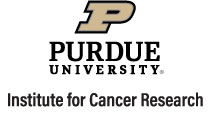| Purdue University Institute for Cancer Research |
 |
|
| 201 South University Street, West Lafayette, IN 47907 https://www.purdue.edu/cancer-research/ Contact: Douglas Cuttell, dcuttell@purdue.edu Twitter:@PUCancerCenter Facebook:@PurdueCancerResearch |
Basic Science Cancer Research | |
| Role(s) | National Cancer Institute (NCI) - Designated Cancer Centers dedicate significant resources toward developing research programs, faculty, and facilities that will lead to better and innovative approaches to cancer prevention, diagnosis, and treatment. With NCI support, the PU-ICR research infrastructure aims to advance scientific goals and foster cancer programs that draw together investigators from different disciplines. |
| Mission | The PU-ICR's mission is different than the missions of clinical and comprehensive cancer centers. The PU-ICR does not treat patients. Rather, its mission focuses on basic discovery - discovery that is the foundation upon which the PU-ICR fosters innovative cancer solutions. |
| History | The Purdue University Institute for Cancer Research was established as an NCI-designated basic science cancer center in 1978 and has maintained its excellence for over 44 years of funding consecutively. As such, the cancer institute's mission focuses on basic discovery - discovery that is the foundation through which the institute fosters innovative cancer solutions. Notably, the cancer institute not only supports basic discovery but also facilitates discovery application and, where possible, positions discoveries for transfer to the public domain. Purdue core strengths in engineering, veterinary medicine, nutrition science, chemistry, medicinal chemistry, pharmacy, structural biology, and biological sciences, are coalesced by the PU-ICR. |
| Org | • Six Research Operations Staff • 124 Faculty Members of various scientific disciplines • Leadership: Dr. Andrew D. Mesecar, Interim Director |
| Board | The cancer institute operates with an external advisory board of cancer research experts and leaders throughout the United States. |
| Finance | Annual support for the Purdue Institute for Cancer Research is from the National Cancer Institute, generous philanthropic gifts from donors and foundations. The research faculty obtain a research base of $26M from a variety of sources from NSF to NIH to industry partners. |
| Data Source | Data sources are specific to individual needs of research faculty and so there are variety of sources from national databases, NIH/NCI initiatives and other cancer focused institutions. |
| Data Access | The cancer institute does not control data access for its research mission since data sources are maintained elsewhere. |
| Tech Capabilities | Ability to collaborate amongst internal faculty and across other cancer centers as well as internationally. The cancer institute has experts in a variety of cancers. |
| Projects | Specifically, as a matrix center, cancer institute leadership draws on core capabilities through its 124 members (spanning veterinary clinicians to engineers) from 21 academic departments and seven colleges across Purdue, to organize an infrastructure of discovery through three Research Programs: Cell Identity and Signaling (CIS), the newly formed Targets, Structures and Drugs (TSD) and Drug Delivery and Molecular Sensing (DDMS). The CIS Research Program advances discovery of novel molecular mechanisms of cell identity and signaling, applies this knowledge towards understanding cancer pathogenesis and uses this knowledge to develop novel, mechanism -based approaches to prevent or inhibit cancer. The TSD Research Program focuses on basic discovery of small molecule agents and biologics with anti-cancer potential. TSD members work to identify new cancer targets, accelerate drug development through synthetic expertise and structure-based drug design, and evaluate developing therapies in appropriate animal models. The DDMS Research Program provides physical science, engineering and technology solutions to advance the understanding of cancer biology and to improve prevention, detection and treatment of cancers. |
| Future Focus | The cancer institute is rooted in fundamental disciplines and will continue to integrate the scientific diversity into collaborations in the following areas: • biology of cancer cells and their environment • mechanism- and target-based therapeutics • synthesis of unique therapeutic chemical entities • novel delivery technology • innovative engineering/ physical science technology to probe cancer-related phenomena • diagnostic and imaging tools |
| Talent Development | The cancer institute is focused on the success of undergraduate and graduate student trainees. The cancer institute is committed to certificate programs, curriculum and experiential learning. |
| Data Sharing Agreements | Genomic and other data are uploaded centrally to the NIH according to NIH/NCI policy. |
| Programs/ Publications | Announcements, News, Annual reports: https://www.purdue.edu/cancer-research/communication/index.php https://www.purdue.edu/cancer-research/about/annual- reports.php |